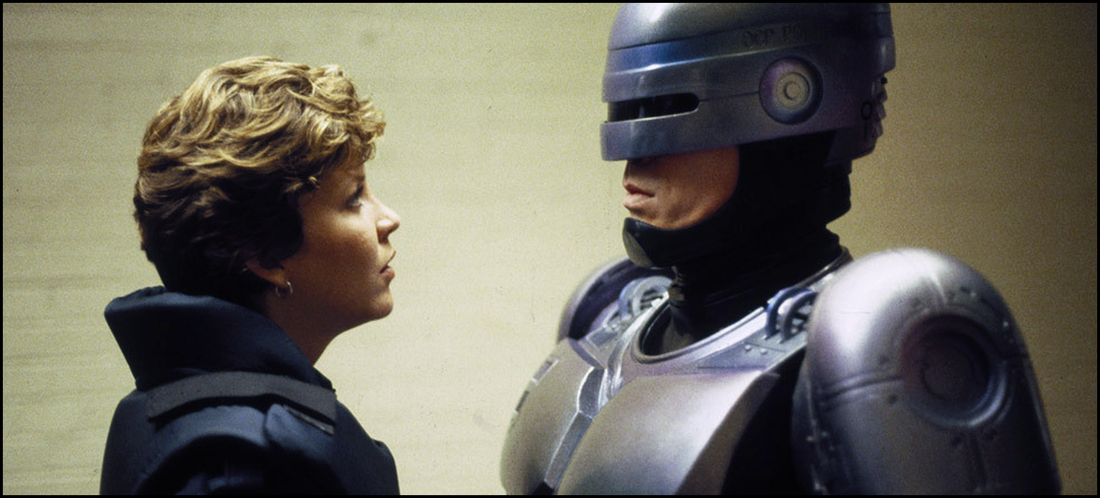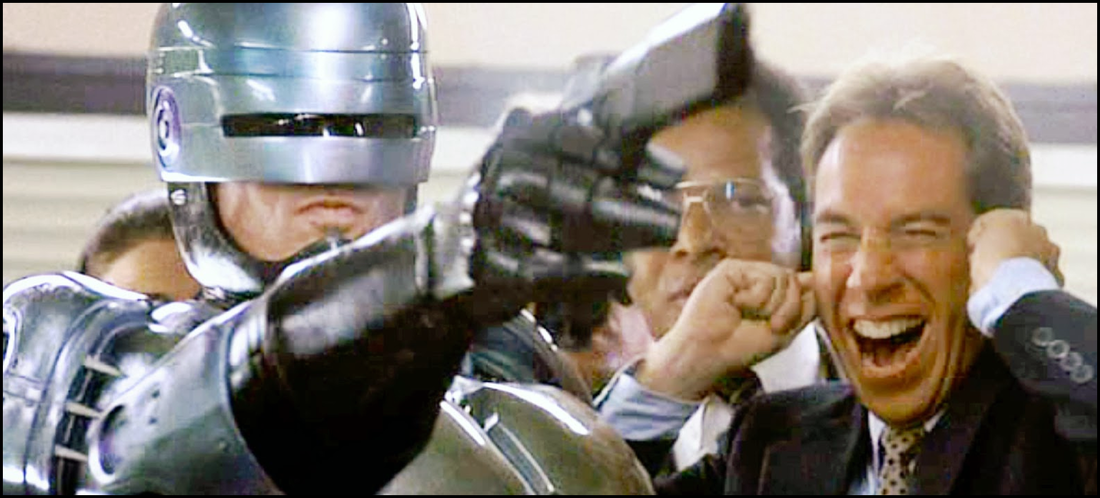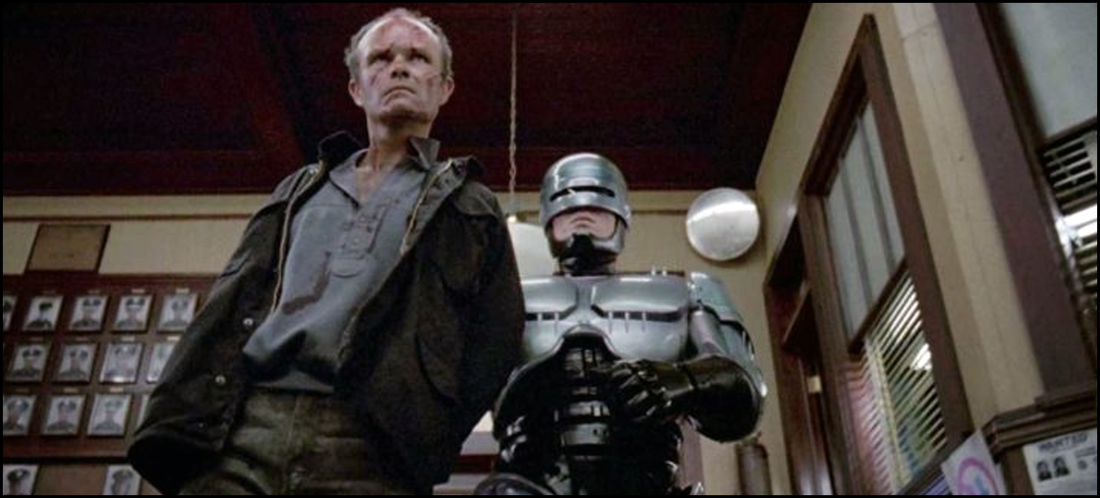From the film’s IMDB.com citation:
“In a dystopic and crime-ridden Detroit, a terminally wounded cop returns to the force as a powerful cyborg haunted by submerged memories.”
I’m not gonna mince words: simply put, Paul Verhoeven’s RoboCop remains one of Science Fiction’s best films. Ever. It’s regarded as such by a great many people – all far more educated and erudite than I am – for a great many reasons, but I’ll try to explain why I agree without belaboring too many of the finer points.
RoboCop emerged on the cusp of the whole ‘tech noir’ movement largely launched by films like Ridley Scott’s Blade Runner (1982) and James Cameron’s The Terminator (1984). In one sense, RoboCop kinda/sorta responded to the trend toward rising violence in these films with an almost mocking sentimentality: whereas other features portrayed the loss of life as part of the narrative process, RoboCop largely lampooned its bloodshed by – in a showman’s secret once revealed by Spinal Tap – dialing it up to eleven. Instead of shooting hundreds of victims with a single bullet each, director Paul Verhoeven – by comparison – captured a single victim – the OCP junior executive Kinney – riddled with hundreds of bullets! (As they say, turnabout is fair play!) Actor Kevin Page certainly left an imprint on screen history as the director’s cut shows him suffering a cruel, cruel fate at the mechanical hands of the ED-209 while his corporate counterparts stand around aghast at the development. And his blood certainly left an imprint on the model city that served as his managerial deathbed.
Indeed, Detroit officer Alex Murphy went down similarly not all that much later in the film. The director’s cut amped up the gunplay considerably, even daring to show a shot previously removed by motion picture censors: Murphy right hand was blasted off – and then his entire right arm – by Clarence Boddicker and his band of heavily-armed thugs … but his fate is another story … namely, the one we’re all here to hear. It was a torturous exit that had to happen, and it was the first step in a journey that would offer Murphy revenge and redemption by the feature’s end.
It’s clearly influenced by Westerns (the cyborgified Murphy can’t help his human tendency to twirl his pistol, the way he had done to impress his young son, in a previous life). It’s clearly dishing out Satire (the TV-within-a-film segments mock the way commercialized newscasts deliver gut-wrenching tragedy, and the pervasive ‘I’d buy that for a dollar’ sitcom antics are clearly caricature what mainstream audiences accept as routine entertainment). Yet the film constantly pushes boundaries as it embraces tenets of the buddy-cop picture, the conventional comedy, and even the horror genre. By mixing these components and balancing them perfectly, RoboCop proves itself vastly greater than the sum of its parts in ways lesser films can only try to recapture. (Yes, I’m looking at you – you inferior sequels, rehashes, and even the remake. When all you can do is copy, then you’re decidedly inferior right out of the gate.)
I’ve long argued that this first picture in a still-growing franchise transcends many similar-themed projects precisely because it never takes itself all that seriously. Again, so much of the film parodies (in a wryly comic way) what audiences have come to expect from a quality SciFi/Fantasy story that it even occasionally feels like a series of smaller skits made whole around the story of a man rising above his circumstances in a way no one predicted. Murphy is remade in the eyes of man with the best science had to offer; but – in the last reel – it’s shown that the machine will never be greater than the man because, inevitably, the conscience in his soul is stronger than any program will ever be. Humanity wins … even if it has to remove a thug like Boddicker for good measure. Justice prevails … even if it’s powered by battery.
Granted, some of Robo’s luster has been tarnished a bit with the passage of time, none of it owed to the power of the original. Lead Peter Weller returned for the sequel, and the greater Nancy Allen returned for that and one more. The property has enjoyed an animated television incarnation – along with a half-baked TV spin-off and miniseries, too – but those entities were constructed really more so to ‘cash in’ on the law officer’s enduring popularity than they were to strengthen his legend. The first film, however, remains a bright spot in all of filmdom and continues to inspire those who find it decades later, just the way a classic picture should.
Thankfully, praise for the seminal flick isn’t limited only to its most ardent fans; in fact, one need only look to the awards season to see it garnered some solid and deserved recognition. The 1988 Hugo Awards saw the feature nominated in the category of ‘Best Dramatic Presentation,’ an honor it lost out on to (ahem) The Princess Bride. The Academy Of Science Fiction, Fantasy, And Horror Films was a bit more realistic, giving RoboCop an incredible eight nominations which ended up translating into five big wins in the categories of ‘Best Special Effects,’ ‘Best Make-Up,’ ‘Best Writing,’ ‘Best Director,’ and ‘Best Science Fiction Film.’ Why, even the Academy Of Motion Picture Arts And Sciences got into the act when it awarded the picture a Special Achievement Oscar for sound effects editing.
Take note, friends: RoboCop was then – and remains today – the real deal.
As for the special features?
Again, I’ve read that an awful lot of these have simply been ‘ported over’ from earlier releases (this happens a lot these days), but I’ll try to give a reasonable summary of what fans can look forward to.
- First up, the Steelbook provides both the Director’s Cut and the original 1987 Theatrical Cut on separate disks.
- The Director’s Cut disc boasts three different commentary tracks along with an incredible assortment of ‘making of’ and ‘celebratory’ shorts that flesh out the release, its cast and crew, and examine the film’s lasting impact on the industry; some deleted scenes; raw shooting dailies; theatrical trailers; and image galleries. Trust me when I say that you’ll be busy for hours.
- The Theatrical Cut disc has a commentary track; an isolated score track; some release and TV airing comparisons; outtakes; and some recently unearthed extras. Again, Arrow Video proves that they’re no slouch when it comes to giving fans what they want … and then some.
Highest recommendation possible.
If I haven’t been clear, then let me just assert unequivocally that RoboCop (1987) is one of my all-time personal favorite films. As can happen to all of us, some of this is owed to the time and place in which I saw it – during my college years, certainly a formative period – but its enduring legacy and the timelessness of its presentation should never be discounted nor underestimated. Verhoeven, Weller, Allen, and all involved were near the top of their storytelling game when they brought this to life – or is that ‘back to life’ – and I predict it’ll remain influential for a great many years into the future.
In the interests of fairness, I’m pleased to disclose that the fine folks at Arrow Video Films provided me with a complimentary 4K Ultra HD Steelbook of RoboCop (1987) by request for the expressed purposes of completing this review; and their contribution to me in no way, shape, or form influenced my opinion of it.
-- EZ




 RSS Feed
RSS Feed